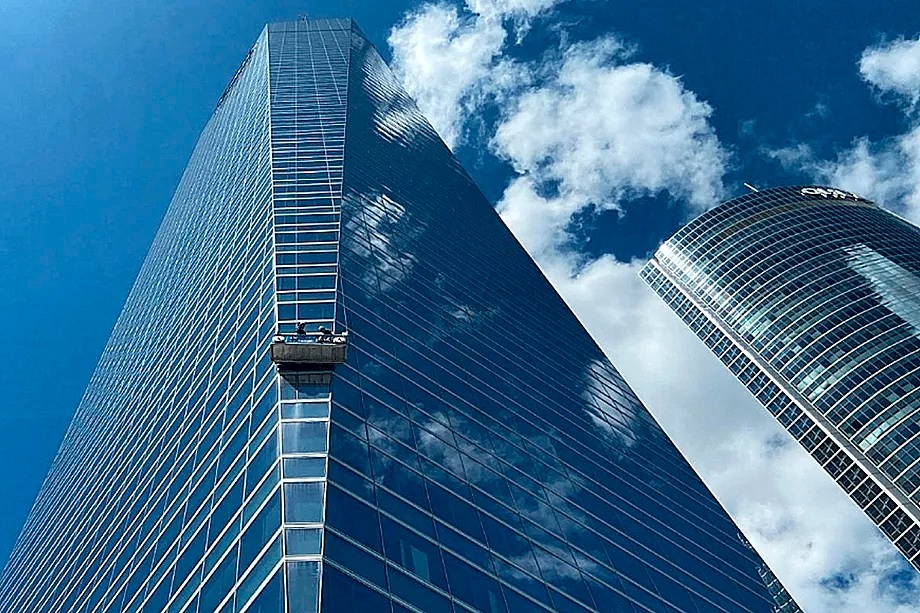The power went out. And Rubén, a 58-year-old window cleaner, is left suspended at over 100 meters high in the Torre Emperador Castellana, one of the tallest in Madrid (224 m.). He is with a colleague, both on a crane that suddenly falls silent when the blackout cuts the motor that supports them, in broad daylight, in the middle of work.
His wife, Nuria, had rushed from her job as a cleaning employee at the Santiago Bernabéu as soon as she heard about the outage. "I came on foot because my husband has the car, and I thought we could go home together faster," she says. But upon arrival, she found him up there: still, tiny, suspended in the air. She waits for over four hours at the base of the tower, while the deployed team - four firefighters and three Samur paramedics - assesses the damage and tries to reach the top to manually activate the crane.
"It's not the first time this has happened to him," Nuria admits, "but these situations always instill fear."
At noon, under scorching sun, the area of the Cuatro Torres becomes a symphony of sirens, honking, and shouts. And Rubén and his colleague are not the only ones. In the neighboring Torre de Cristal, two other workers are trapped in the air, peering into the abyss from an immobile gondola.
Communication fails, and chaos grows. "We had trouble talking among ourselves. We didn't know if reinforcements were coming," admits one of the firefighters. While they managed to act in just under two hours at the Torre de Cristal, Nuria had to wait much longer to be reunited with her husband.
There are moments of confusion: first, they try to lower them, but the mechanism doesn't respond, so they have no choice but to raise them, push by push, the 224 meters that the tower measures. The process is slow, tedious, and, for the thirty or so onlookers watching from below, agonizing.
Much of the business park is left in the dark. "The power went out on our floor, and we were told there was nothing to do. They opened the emergency exits for us and sent us home," says an employee. But the mission to return to the safety of home is also a challenge: many cannot get their cars out of the parking lot, blocked by electrical failures, and those who do encounter a sea of trapped vehicles and disoriented pedestrians, in the midst of absolute chaos.
The La Paz Hospital, very close to the area, also experiences critical moments. According to internal sources, the blackout lasted about five minutes until the generators kicked in. "In theory, they can last 24 hours, but we had never faced such a complete outage. We don't know exactly what consequences there might be," admit those from the center. To conserve energy, the management ordered the suspension of all non-essential activities, prioritizing surgeries and emergencies. Nevertheless, the elevators remained out of service, and many consultations were in the dark.
The scene in the commercial area was almost like a movie. A McDonald's proudly promoting its 24-hour service, closed. A Rodilla turned into an improvised shelter for those wandering in search of something to eat in the darkness. "People rush in here. Many have waited in line for over 20 minutes only to find out they couldn't pay by card," says one of the customers.
Only the kiosk in front of the hospital remained open. "Today we've lost more stock than we've sold. We've had to give away ice creams and drinks," resignedly says the owner while attending to those inquiring about bus routes.
In the pharmacy in the area, Esperanza, one of the employees, has to manually open and close the automatic doors. "We can't process payments or access the system. We haven't been able to sell anything all day," she laments. But the big question is how to leave her workplace: "We couldn't communicate with our supervisors, and we don't know how we'll close up because the entire system is automatic."
On the street, public transportation is another reflection of disorder. Buses divert their routes to Plaza de Castilla to pick up the hundreds of stranded people, although many display signs saying "no passengers allowed" because they were already full.
"Total chaos," summarize two police officers tasked with being present at hospitals and shopping centers. "We're focusing on transporting those in need of medical assistance who can't ask for help," they explain.
